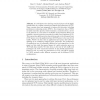Free Online Productivity Tools
i2Speak
i2Symbol
i2OCR
iTex2Img
iWeb2Print
iWeb2Shot
i2Type
iPdf2Split
iPdf2Merge
i2Bopomofo
i2Arabic
i2Style
i2Image
i2PDF
iLatex2Rtf
Sci2ools
124
click to vote
EURONGI
2004
Springer
2004
Springer
Performance of Different Proxy Concepts in UMTS Networks
It is well known that the large round trip time and the highly variable delay in a cellular network may degrade the performance of TCP. Many concepts have been proposed to improve this situation, including performance enhancing proxies (PEPs). One important class of PEPs are split connection proxies, which terminate a connection from a server in the Internet in a host close to the Radio Access Network (RAN) and establish a second connection towards the mobile User Equipment (UE). This connection splitting can be done either purely on the transport layer (TCP proxy) or on the application layer (HTTP proxy in the case of web traffic). While it is clear that an application layer proxy also infers the splitting of an underlying transport layer connection, the performance of applications may be essentially different for both approaches. In this paper, we first study the general impact of a split connection proxy on TCP bulk data transfer. We then focus on the case of web traffic and investi...
Related Content
| Added | 20 Aug 2010 |
| Updated | 20 Aug 2010 |
| Type | Conference |
| Year | 2004 |
| Where | EURONGI |
| Authors | Marc Necker, Michael Scharf, Andreas Weber 0003 |
Comments (0)

